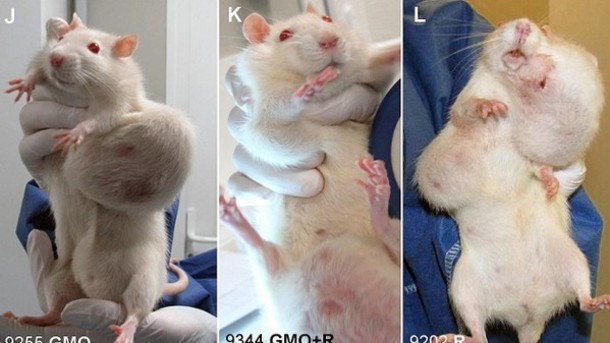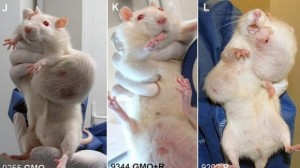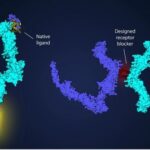November 30, 2013 – Back in September 2012 I wrote about a European research study showing the results of a control group of rats being fed Monsanto genetically modified Roundup-tolerant corn. The rats developed massive tumors and the pictures of these unfortunate creatures hit the front pages of newspapers around the world. At the time a number of scientists raised issues with the rigor of the study. They asked why standard toxicology protocols weren’t followed, why the study was limited to a selective group of rats, what was the genetic makeup of the rats, and where were the results of the control group no fed the genetically modified corn.
Better than one year later the journal where the study appeared has withdrawn it from publication after doing a thorough review of the data provided by the researchers. The original study was sensationalized by its authors right from the beginning, becoming more a publicity stunt than valid science. And the result was a mobilizing of anti-genetically modified food evangelists who were able to create lots of political hay with temporary bans on GM products and research among countries of the European Union, Russia and Africa.
In the end the study was rejected for being scientifically unsound, using a control group of animals already predisposed to cancerous tumors, and reporting only selective data to represent a particular agenda, rather than sound science. The fallout from all of this was the spreading of fear, uncertainty and doubt and the image of industry run amok creating Frankenfoods.















((The fallout from all of this was the spreading of fear, uncertainty and doubt and the image of industry run amok creating Frankenfoods.))
That’s not the worst of it. The publication of false results in peer-reviewed journals suggests one has just as good cause to believe St. Mathew’s account of the supernatural virgin birth as to believe in results published in scientific journals. The traditional burning at the stake of religious heretics seems a bad policy, but it might be a good one for ‘scientists” who deliberately delude the public. Those who published the rat tumor report certainly knew their experimental method was unsound. It’s unclear what Mathew really thought about the validity of his virgin birth revelation.
Belief in Mathew’s report must be grounded on faith in problematic subjective revelation, but science has been trying to claim the ethical high ground because its assertions are ostensibly based on honest objective evidence that in principle is available to any interested person. A withdrawal of the distorted GMO rat study isn’t enough remedy for the offense. The scale of the sin requires that some of the sinners be burned at the stake or at least drawn and quartered. If children can’t place their faith in ‘science,’ where should they place it?
As always, expressed with forceful conviction. I agree with you that the authors of the study need to be censored by the academic community in a very public way.
Truly amazing!
Especially as the European Food Safety Authority (EFSA) has adopted the research methods used by Prof. Seralini as official standards for modern food safety research, since they were seen as being more robust than currently accepted methods.
Highlights of the new EFSA guidelines include that the type of rat species used by Prof. Seralini, the Sprague-Dawley (SD) rat, is, indeed, appropriate for use in long-term food safety studies. (you know, it’s the type of rats used by Prof. Seralini in his study)
The EFSA agreed that long-term food safety studies do not necessarily need a narrow and fixed hypothesis. (you know, this was another criticism that was levied against Prof. Seralini’s work since GMOs themselves are considered still to be technically a novelty, constructing studies in a more “exploratory” fashion, like Prof. Seralini did, is considered completely acceptable).
The EFSA said studies using historical control data “should be considered with caution,” as it can lead to false outcomes. (you know, the type of study frequently used by Monsanto et al to essentially arrive at pre-determined outcomes). According to the EFSA,
But hey, don’t believe me. Get it from the horse’s mouth yourself.
http://www.efsa.europa.eu/en/efsajournal/pub/3347.htm
Thank you, you’ve made it VERY CLEAR who pays your bills!!!
I have no love for Monsanto. Not in anyone’s pocket but am interested in verifiable science that isn’t hyped to create headlines. I will check out your claims, but I have seen the critiques of the study. No one appears to have received a stipend from Monsanto for their opinions.